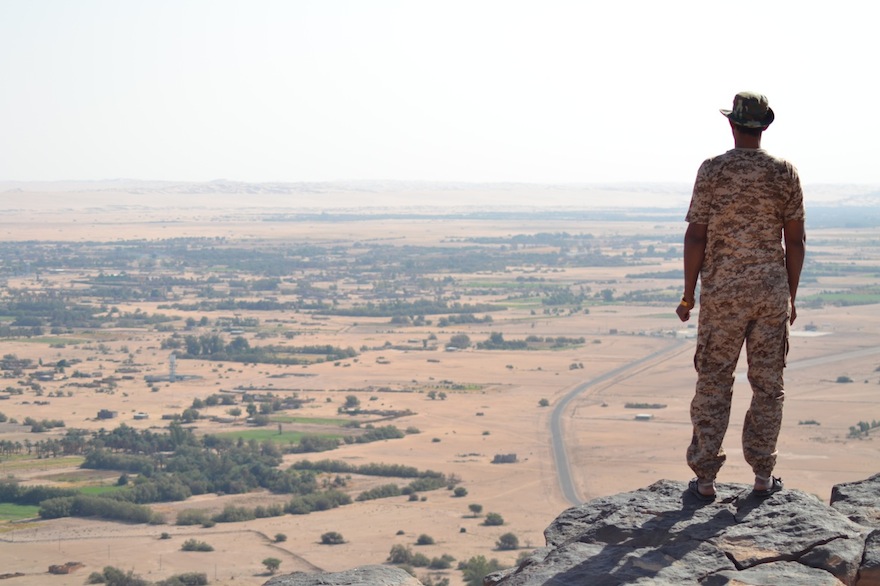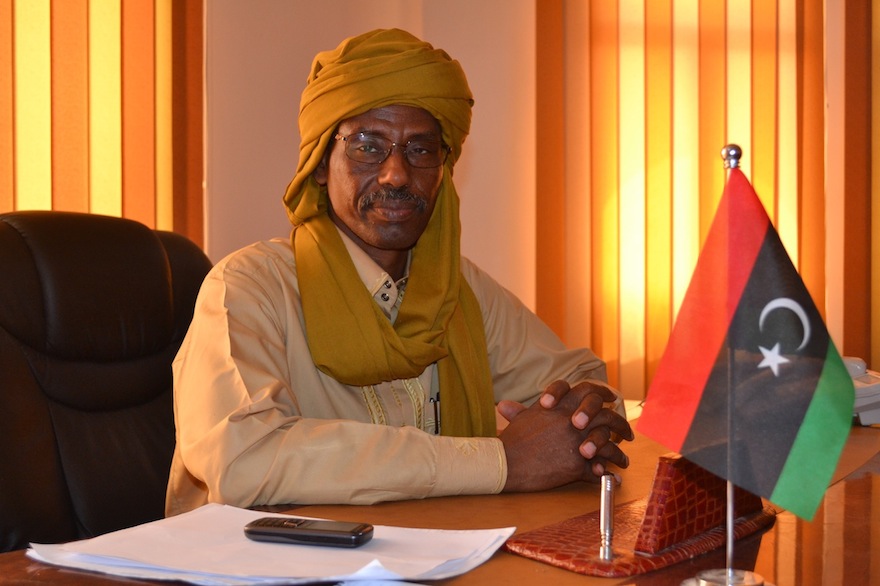By Mathieu Galtier.

Sebha, 20 September 2013:
Standing under the shade of a large sign in front of the Fezzan Hotel, the only . . .[restrict]one still working in Sebha, capital of Fezzan, Marc (not his real name) lists all the adventures he passed through to travel from Guinea to Libya: the struggle to save the money, the sad good-byes to his family, the thirst which forced him to drink in the same pond as camels – and other miseries besides.
What about crossing the borders between Niger and Libya? “Nothing to say. We were four migrants in the pick-up. We crossed the border at Madama (in Niger, near Tumu, the Libyan official border crossing station). Nobody asked us for official documents.”
General National Congress (GNC) officially declared most of South as a military zone and voted to close Libya’s southern borders on 17 December. On the ground, nothing has changed. Basically, Libya’s southern border is controlled from Algeria border to Western Niger border by Tuaregs and from Niger Eastern border to a part of the Sudanese border, by Tebus. All in all it is about 2,500 kilometres.
600 illegal immigrants a day
“About 600 illegal immigrants cross the border every day. Tripoli authorities have never come to visit the borders. We send requests for more materials: new cars and new weapons but we have never received a reply”, explains Colonel Barca, head of military security for Murzuk area, controlled by the Tebus.
In August, a delegation of Tebus, Arabs from the south and Tuaregs was in Niger to discuss efforts to control the border more efficiently although neither the government not the GNC organised or financed the meeting. A similar delegation us expected to go to Chad soon. “For the first time, Tebus and Tuareg have decided to collaborate at the borders. We will have a direct communication between Murzuk [the main Tebu centre, 150 kilometres south-west of Sebha] and Obari [the main Tuareg centre, 200 kilometres west from Sebha]”, Hamadi Abad, a Tuareg delegate, explains with enthusiasm. Right now, both ethnic groups organise themselves as they want in their “preserve”, as some put it.
Corruption among border guards?
Tebus are controlling the longest part of the souther border. Eighteen armed groups – the number of men is kept secret – keep in touch with each other to control it. Colonel Barca explains: “We cannot check every car that crosses the border. So I have decided to focus on three main issues: drugs, alcohol and weapons.” The implication is that oil, food and human smugglers are more or less free to make business and that Tebus make money from the trade. “It is well-known that Tebus’ wealth come from trafficking,” a prominent Sebha resident claims. “For example, the locality of Umm Al-Aranib [about 95 km east from Murzuk] is used as a storage place for smuggled goods”.
Colonel Barca admits some instances of corruption among border guards: “The government gives no wages to the thuwars [revolutionnaries]. Only those who used to be policemen or soldiers get their salary.” As a feared and respected chief, Colonel Barca has been master of the border in the Murzuk area since the revolution and he has no intention of giving up his key role. That is possibly why he has never requested extra men from Tripoli to check the border.

In comparison with Tebus, the Tuaregs do not appear as well organised. The local council identifies nine official brigades in Obari. Officially all are under the control of Ministry of Defence or the Chief of Staff’s office.
The main one is named Tenere (“desert” in the Tuareg language) katiba.
“We are given the order to protect the pass of Anay [about 234 kilometres south-west from Sebha]. I can assure you that no weapons, drugs or any smugglers come through this point. But, I don’t know what is going on and which brigade is in charge of the rest of the border. Sometimes, we notice armed cars through field glasses, so we do a report,” Ahmed Bilal, deputy leader of the katiba, explains.
What if, one day, they face heavily armed traffickers at the pass of Anay?
“I tell my men not to try to catch them if they are too strong”, Ahmed Bilal replies.
An Al-Qaeda camp between Ghat and Algeria
In addition to smugglers, it is in Obari area that Islamists are said to have sought asylum after the North Mali war. “I certify I saw Al-Qaeda small camp of four to six picks-up in Isseyne, at the border between Ghat and Algeria. It was before Ramadan. I made a report but the authorities replied: ‘Don’t do anything. You don’t see it. You don’t look at it!’,” Hassan Massafer, a member of Katiba 206 in Obari (the only one composed of Tebus), says, angrily hitting his hand on the desk.
French writer Samuel Laurent relates that Katiba 315 in Obari is used as a “transit camp” for Islamists. He writes that the terrorists who committed the deadly In Amenas attack across the border in Algeria in January spent one night in the katiba building in his book Sahelistan.
“It is lie!”, Mohamed Raadi Al-Ansari, the deputy dead of Katiba 315, insists. “We have nothing to do with Islamists. Besides, we are all former member of the army in the previous regime, so Islamists are against us.” As proof, he invites journalists to the tour of the katiba headquarters: an about barracks where an hangar stands in the middle. Inside, three old 4×4 vehicles and a tarpaulin which reveals two 14-mm “dushkas” (anti-aircraft machine guns), one RPG, one FN assault rifle, seven kalashnikovs and a dozen of boxes of ammunition. “It’s not the armoury of terrorists”, Al-Ansari says smiling.
Such a bareness of weapons in such an over-armed country appears quite surprising.
From others come different views.
“Don’t trust the katiba. They are financed by Islamists. If you come back in three months, be sure that all the young people you saw inside will be gone to fight. They hide weapons in Machrouaa area in Obari”, inhabitants warn.
The mysterious Katiba 315 in Obari
Machrouaa is a like a slum with tiny buildings with zinc roofs and small dirt streets in which wires trail on the ground where barefoot children are playing. “I don’t want to speak about Al-Qaeda but I can understand the men who are leaving to fight. There is nothing here – not a proper electricity network, no tap water, no hope”, Bubaker from Machrouaa sums up.
The town is where Sheikh Ahmed Omar, head of Katiba 315, has his religious school.
“None of the 500 members of the katiba leaves to fight in Syria or anywhere else. We have all the official documents to prove that we follow the rules of the government”, Sheik Ahmed Omar’s close friend says. The same source assure that Sheikh Ahmed has no link with Mokhtar Belmokhtar, military commander of Al-Qaeda for an Islamic Maghreb (AQIM).
Tuareg civil authorities do not deny that Islamists could be in their territory but they accuse Tripoli of using the argument in order not to process their request to give Libya national ID numbers to 14,000 Tuareg families.
For their part, Arabs in Sebha are convinced that Tebus and Tuaregs use their control of the borders to allow fellow members of their ethnic communities into Libya. They fear they could end up being a minority in Fezzan. “We have no problem with Libyan Tuaregs and Tebus. We are brothers. But the others from Niger or Chad were used by Qaddafi. They are the smugglers and the traffickers”, Ayoub Zaroug, head of Sebha Local Council, says.
“We have to create a force which will be formed of Libyans from every tribe to control the border,” Abubakr Ehwaili, an independent Congressman from Sebha, says. “At present there are only Tebus and Tuaregs. It is not secure.” [/restrict]










